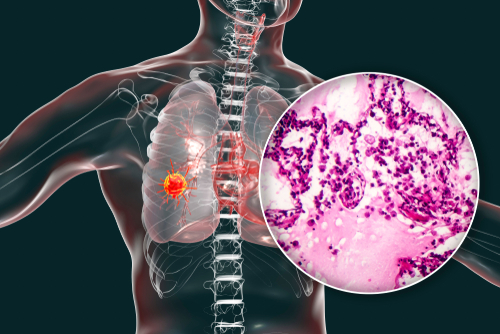
Lung adenocarcinoma (LUAD) accounts for approximately 80% to 85% of reported lung cancer cases and develops in a sequential multistage pattern, gradually forming genetic and epigenetic alterations. Alterations in DNA methylation at CpG sites are associated with smoking-induced lung cancer, and smoking-related epigenetic alterations are involved in the modulation of multiple biological pathways. Enhancers govern gene expression across great distances by looping DNA and offering distant regulatory regions closer to their target gene promoters. Researchers recently employed Illumina HM450k DNA methylation data of patients from The Cancer Genome Atlas to determine enhancer and link enhancer status with the expression of target genes to discover transcriptional targets. They also investigated a technique for predicting enhancer-target interactions by combining epigenomic and transcriptomic data from primary tumor samples. Results of the study were presented at the ESMO Targeted Anticancer Therapies Congress 2024.
The researchers were able to identify target genes specifically regulated by enhancers with differential methylation patterns in LUAD, and they revealed target genes of the differentially methylated sites and the enriched motifs modulating their expression in LUAD progression. These target genes play a key role as central regulators of ribosome biogenesis, RNA processing, and dysregulated mitochondrial ribosomal proteins, impacting mitochondrial translation and oxidative phosphorylation.
The researchers concluded that their study “illuminates the landscape of LUAD progression, intricately shaped by smoking-induced genetic and epigenetic alterations. Using enhancer-target interactions through advanced analyses of DNA methylation data, we uncovered specific transcriptional targets influenced by differential methylation patterns, which allowed us to identify key hub genes central to critical pathways. This comprehensive approach enhances our understanding of LUAD pathogenesis, providing potential avenues for targeted therapeutic interventions.”
Source: Mukherjee A. Integrative epigenomics and transcriptomics analysis to identify signature biomarkers of lung adenocarcinoma. Abstract 4P. Presented at the ESMO Targeted Anticancer Therapies Congress 2024; February 26-28, 2024; Paris, France.






 © 2025 Mashup Media, LLC, a Formedics Property. All Rights Reserved.
© 2025 Mashup Media, LLC, a Formedics Property. All Rights Reserved.